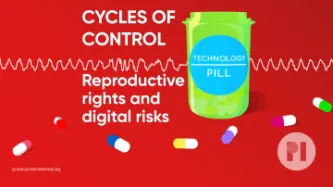Advanced Search
Content Type: Video
LinksLearn more about Repro uncensoredRepro Uncensored incident report formAdriana Smith's caseMore about Adriana's casePrivacy International's Menstruation apps researchResearch on Bing's Typo-searchingMSI on the Global impact of Roe V. Wade being overturnedReport by Fòs Feminista on the Global Impact of the Dobbs DecisionMeta getting rid of factchecking functionAmazon USA report called Obstacles to Autonomy, which includes info on advertising account restrictionsAn report by the Independent…
Content Type: Long Read
Table of contentsIntroductionWeighing the (potential) benefits with the risksPrivacy rights and the right to healthThe right to healthPrivacy, data-protection and health dataThe right to health in the digital contextWhy the drive for digitalImproved access to healthcarePatient empowerment and remote monitoringBut these same digital solutions carry magnified risks…More (and more connected) dataData leaks and breachesData sharing without informed consentProfiling and manipulationTools are not…
Content Type: Long Read
Introduction
The 28th of September marks International Safe Abortion Day. It remains a day necessary to mobilise and raise awareness of the continued struggles women and girls face when accessing reproductive healthcare, including access to safe abortion. Across the world, abortion continues to be criminalised, restricted and in some places under attack. All of which constitute severe obstacles for women and girls to fully exercise their human rights, particularly their right to privacy, which…
Content Type: Long Read
The rise of the gig-economy, a way of working relying on short term contracts and temporary jobs rather than on an employed workforce, has enabled the growth of a number of companies over the last few years. But without the rights that comes with full employment, gig economy workers today don't have access to essential protections.
In 2021, PI worked with ACDU and Worker Info Exchange to shed a light on the power imbalance between workers and gig economy platforms, exposing how workers find…
Content Type: News & Analysis
The relationship between privacy and access to abortion care
In 1973, in the state of Texas, it was a criminal offence to “procure or attempt” an abortion except if the purpose was “saving the life of the mother.” This law was enacted in 1854 by the Texas state legislature, and was part of a wave of provisions criminalising access to abortion care that was gaining ground across the U.S in the mid-1800s. It is worth highlighting that these laws were being passed at a time when women in the U.S…
Content Type: Long Read
In the wake of the recent news of the US Supreme Court’s decision to overturn the ruling of Roe v Wade in its ruling in Dobbs v Jackson Women's Health Organization, headlines have been dominated by conversations around privacy and fears of how the criminalisation of abortion care and surveillance by law enforcement will play out in a tech driven world.This discussion is increasingly important as governments move towards digitising their healthcare systems and as more individuals choose to…
Content Type: Long Read
This piece is a part of a collection of research that demonstrates how data-intensive systems that are built to deliver reproductive and maternal healthcare are not adequately prioritising equality and privacy.
Digital health apps of all kinds are being used by people to better understand their bodies, their fertility, and to access health information. But there are concerns that the information people both knowingly and unknowing provide to the app, which can be very personal health…
Content Type: Long Read
This piece is a part of a collection of research that demonstrates how data-intensive systems that are built to deliver reproductive and maternal healthcare are not adequately prioritising equality and privacy.
What are they?
Short Message Services (SMS) are being used in mobile health (MHealth) initiatives which aim to deliver crucial information to expecting and new mothers. These initiatives are being implemented in developing countries experiencing a large percentage of maternal and…
Content Type: Long Read
For over 20 years with the start of the first use of ICTs in the 1990s, we have seen a digital revolution in the health sector. The Covid-19 pandemic significantly accelerated the digitalisation of the health sector, and it illustrates how fast this uptake can be and what opportunities can emerge; but also, importantly, the risks that it involves.
As we've said many times before, whilst technologies can be part of the solution to tackle some socio-economic and political challenges facing our…
Content Type: Long Read
Image source
This piece is a part of a collection of research that demonstrates how data-intensive systems that are built to deliver reproductive and maternal healthcare are not adequately prioritising equality and privacy.
Telemedicine describes the vast range of applications and technologies used to provide and manage healthcare remotely.
Telemedicine as its most basic refers to the transmission of data from a patient to a healthcare professional through a range of electronic…
Content Type: Long Read
Image found here.
Founded in 1959, Bounty UK Limited markets itself as an information service for pregnant women and new mothers. Prior to the pandemic, it was best known for distributing “Bounty packs” of free samples of baby products to pregnant women at midwife appointments, to new mothers on maternity wards in the UK and through its digital presence via its website and app. Bounty representatives also sold new born photography packages to new mothers at the hospital bedside. Bounty entered…
Content Type: Video
You can listen and subscribe to the podcast where ever you normally find your podcasts:
Spotify
Apple podcasts
Google podcasts
Castbox
Overcast
Pocket Casts
Peertube
Youtube
Stitcher
And more...
And support PI's work here: support.privacyinternational.org
Content Type: Video
Dr. Andrea Swartzendruber is the principal investigator for the Pregnancy Resource Center Evaluation at Emory University's Center for Reproductive Health Research in the Southeast. She is an assistant professor in the Department of Epidemiology and Biostatistics at the University of Georgia College of Public Health and an adjunct professor at Emory University Rollins School of Public Health. She has recently published and presented research findings on pregnancy resource centers (also known…
Content Type: News & Analysis
Abortion without privacy guarantees is not safe abortion.
Safe access to abortion is far from guaranteed throughout the world. And in many countries, there are groups working hard to make sure that safe access to this vital component of reproductive healthcare remains out of reach.
Online platforms are the new arena of anti-reproductive advocacy, and those opposed to reproductive rights are increasingly deploying digital, data-exploitative strategies. By using and developing digital…
Content Type: Video
You can listen and subscribe to the podcast where ever you normally find your podcasts:
Spotify
Apple podcasts
Google podcasts
Castbox
Overcast
Pocket Casts
Peertube
Youtube
Stitcher
And more...
Content Type: Advocacy
Privacy International responded to a call for submissions of the Working Group on Discrimination Against Women and Girls on the sexual and reproductive health and rights of women and girls in situations of crisis.
This submission builds on PI’s research highlighting the ways in which data exploitative technologies can obstruct the realisation of sexual and reproductive rights, and research carried out by our partners on the specific manifestations of these obstacles in multiple countries of…
Content Type: Video
Find out more here: https://privacyinternational.org/long-read/3669/documentation-data-exploitation-sexual-and-reproductive-rights
You can listen and subscribe to the podcast where ever you normally find your podcasts:
Spotify
Apple podcasts
Google podcasts
Castbox
Overcast
Pocket Casts
Peertube
Youtube
Stitcher
And more...
Content Type: Video
This podcast is part of a special series from PI's Reproductive Rights and Privacy Project.
The series comes out on the last Monday of every month.
You can listen and subscribe to the podcast where ever you normally find your podcasts:
Spotify
Apple podcasts
Google podcasts
Castbox
Overcast
Pocket Casts
Peertube
Youtube
Stitcher
and more...
Content Type: Advocacy
Privacy International and Hiperderecho made a joint submission to the UN Committee on the Elimination of all Forms of Discrimination Against Women (CEDAW) ahead of the Committee finalising the list of issues for the examination of Peru.
The submission builds on research commissioned by Privacy International and carried out by Hiperderecho on the state of reproductive rights in Peru, and how their exercise intersects with privacy and tech.
The submission is available in…
Content Type: Video
This podcast is part of a special series from PI's Reproductive Rights and Privacy Project.
The series comes out on the last Monday of every month.
You can listen and subscribe to the podcast where ever you normally find your podcasts:
Spotify
Apple podcasts
Google podcasts
Castbox
Overcast
Pocket Casts
Peertube
Youtube
Stitcher
and more...


























